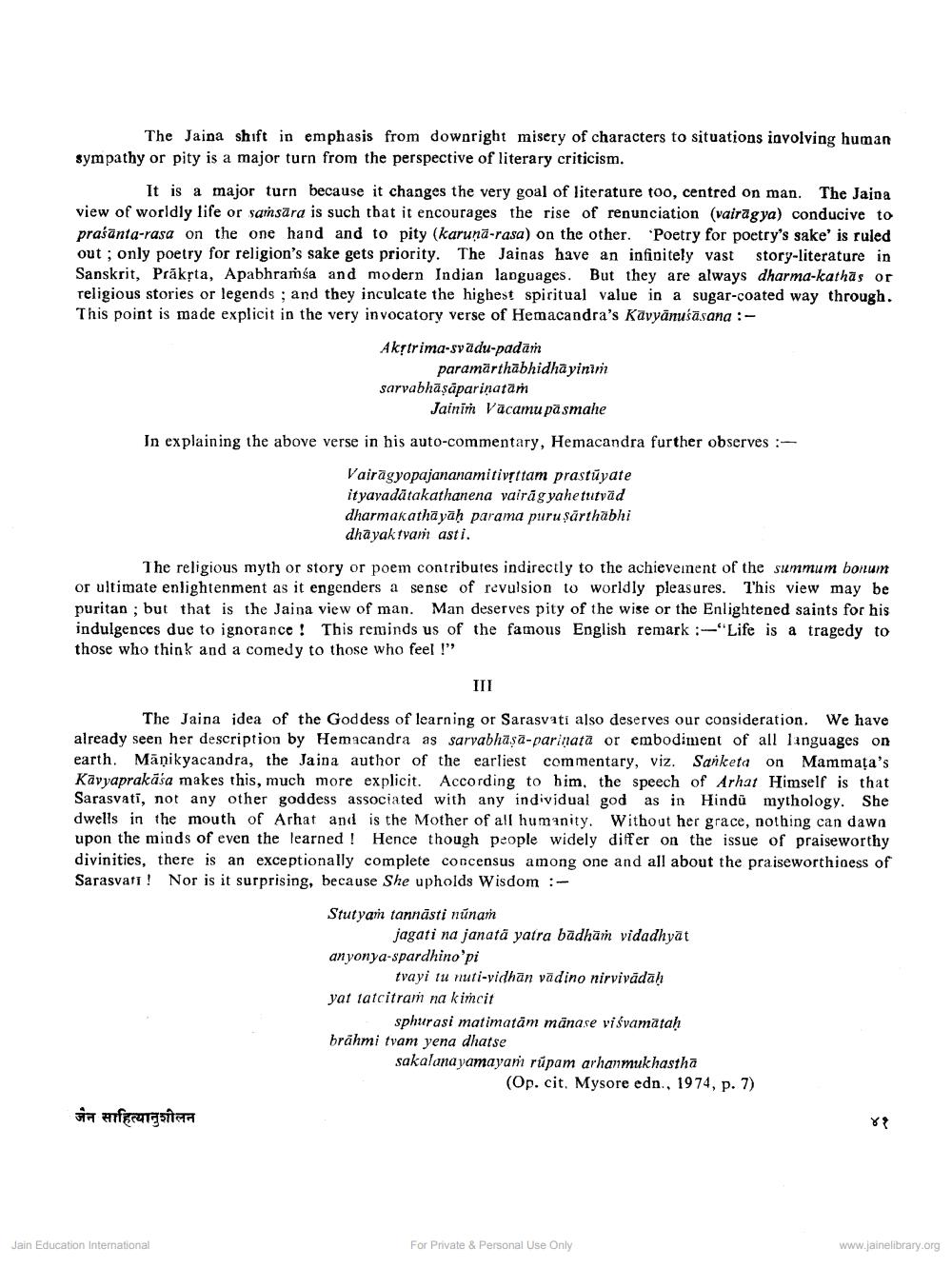Book Title: Jaina contribution to Indian Poetics Author(s): K Krishnamoorthy Publisher: Z_Deshbhushanji_Maharaj_Abhinandan_Granth_012045.pdf View full book textPage 2
________________ The Jaina shift in emphasis from downright misery of characters to situations involving human sympathy or pity is a major turn from the perspective of literary criticism. It is a major turn because it changes the very goal of literature too, centred on man. The Jaina view of worldly life or samsara is such that it encourages the rise of renunciation (vairagya) conducive to prasanta-rasa on the one hand and to pity (karuna-rasa) on the other. Poetry for poetry's sake' is ruled out; only poetry for religion's sake gets priority. The Jainas have an infinitely vast story-literature in Sanskrit, Praksta, Apabhramsa and modern Indian languages. But they are always dharma-kathas or religious stories or legends; and they inculcate the highest spiritual value in a sugar-coated way through. This point is made explicit in the very invocatory verse of Hemacandra's Kavyanusasana : Akstrima-svadu-padan paramarthabhidhayinin sarvabhasaparinatan Jainim Vacamu pasmahe In explaining the above verse in his auto-commentary, Hemacandra further observes : Vairagyopajananamitivsttam prastuyate ityavadatakathanena vairag yahe tutvad dharmakathayah parama purusarthabhi dhayaktvan asti. The religious myth or story or poem contributes indirectly to the achieveinent of the summum bonum or ultimate enlightenment as it engenders a sense of revulsion to worldly pleasures. This view may be puritao ; but that is the Jaina view of man. Man deserves pity of the wise or the Enlightened saints for his indulgences due to ignorance ! This reminds us of the famous English remark :-"Life is a tragedy to those who think and a comedy to those who feel !" III The Jaina idea of the Goddess of learning or Sarasvati also deserves our consideration. We have already seen her description by Hemacandra as sarvabhasa-parinata or embodiment of all languages on earth. Manikyacandra, the Jaina author of the earliest commentary, viz. Sanketa on Mammata's Kavyaprakasa makes this, much more explicit. According to him, the speech of Arhat Himself is that Sarasvati, not any other goddess associated with any individual god as in Hindu mythology. She dwells in the mouth of Arhat and is the Mother of all humanity. Without her grace, nothing can dawn upon the minds of even the learned ! Hence though people widely differ on the issue of praiseworthy divinities, there is an exceptionally complete concensus among one and all about the praiseworthiness of Sarasvati! Nor is it surprising, because she upholds Wisdom : Stutyan tannasti nunam jagati na janata yatra badham vidadhyat anyonya-spardhino'pi tvayi tu nuti-vidhan vadino nirvivadah yat tatcitram na kincit sphurasi matimatam manase visvamatah brahmi tvam yena dhatse sakalanayamayani rupam arhanmukhastha (Op. cit, Mysore edn., 1974, p. 7) जैन साहित्यानुशीलन Jain Education International For Private & Personal Use Only www.jainelibrary.orgPage Navigation
1 2
